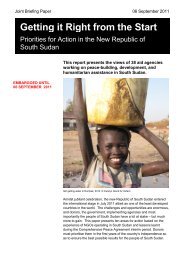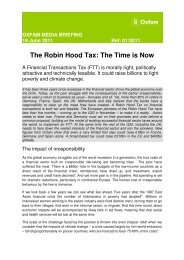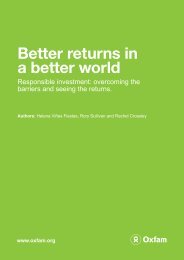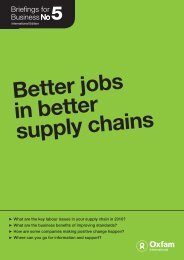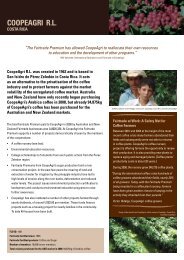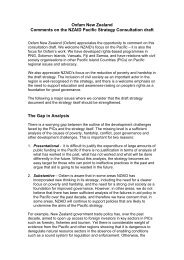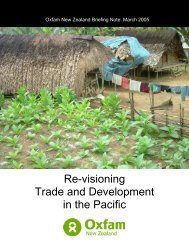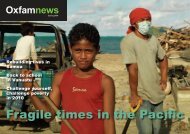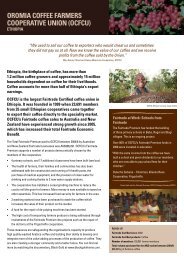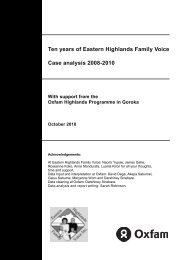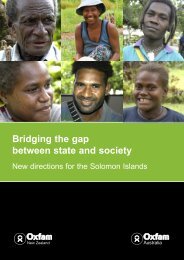2.<strong>Banana</strong> trade wars<strong>The</strong> European Union is a hugely significant player in <strong>the</strong>world banana trade, importing about a third of all tradedbananas – about <strong>the</strong> same amount as North America –and more than three times that of Japan and Russia, <strong>the</strong>third and fourth biggest importers. EU policies <strong>the</strong>reforehave a major impact on <strong>the</strong> world trade in bananas. While<strong>the</strong> EU banana import system of quotas and tariffs hasbeen at <strong>the</strong> centre of global trade disputes, reformsintroduced on 1 January 2006 have drastically reduced<strong>the</strong> level of market intervention.2.1 <strong>The</strong> story so far<strong>The</strong> formation of <strong>the</strong> Single European Market in 1992meant that <strong>the</strong> European Union had to consolidate <strong>the</strong>various tariff and quota arrangements across Europeancountries for <strong>the</strong> importation of bananas. 10 Followinglengthy debates, a system of both quotas and tariffs wasadopted in July 1993.<strong>The</strong> EU arrangements however were non-compliant withWorld <strong>Trade</strong> Organization (WTO) rules which promotetrade liberalisation by removing trade barriers such asquotas, tariffs, and subsidies. Latin American bananaexporting countries and <strong>the</strong> USA lodged a series of legalchallenges at <strong>the</strong> WTO claiming that <strong>the</strong> EU regimediscriminated against Latin American producers andhampered <strong>the</strong> expansion of, mainly US, multinationalcompanies.In response, <strong>the</strong> EU agreed to end <strong>the</strong> quota systemand introduce a single tariff for all banana imports. As aninterim measure, <strong>the</strong> WTO agreed that <strong>the</strong> EU could waive<strong>the</strong> single tariff and continue tariff-free entry for bananasfrom African, Caribbean and Pacific (ACP) countries inorder to honour long-term commitments that would endin 2008. 11<strong>The</strong> crux of <strong>the</strong> argument regarding <strong>the</strong> tariff was thatLatin American governments and companies wantedto ensure that <strong>the</strong> single tariff was set at a level <strong>the</strong>ybelieved would be low enough to make it remunerativefor <strong>the</strong>ir businesses. However small farmers’organisations, plantation workers’ unions and manyNGOs argued that by simply removing quotas and usingtariffs, <strong>the</strong> market would be flooded with cheaperbananas, pushing import prices down, threateningmillions of livelihoods as multinational banana companiesabandoned higher-cost producing countries in searchof cheaper production. On top of that, if <strong>the</strong> tariff wasfixed too low, higher-cost producers like <strong>the</strong> smallfarmers of <strong>the</strong> Windward Islands were under threat ofbeing squeezed out of <strong>the</strong> market altoge<strong>the</strong>r.Following multiple rounds of consultation and debate <strong>the</strong>EU eventually implemented in 2006 a single tariff ofg176/tonne which in effect only applied to LatinAmerican imports as duty-free entry for ACP imports wasmaintained for a volume which effectively covered all <strong>the</strong>irEU exports. As predicted, since 2006 import volumesfrom both Latin America and West Africa have grownwhile prices inside <strong>the</strong> EU fell and, as feared, price-cuttingby major European retailers is fur<strong>the</strong>r squeezing <strong>the</strong> payand conditions of plantation workers at <strong>the</strong> bottom of <strong>the</strong>banana supply chain. 12However <strong>the</strong> matter didn’t end <strong>the</strong>re. In 2007, Ecuadorand Colombia lodged complaints that <strong>the</strong> EU reformshad hit <strong>the</strong>ir EU banana sales and <strong>the</strong> US againcomplained that duty-free access for ACP countries wasdiscriminatory. <strong>The</strong> EU protested that <strong>the</strong> US action wouldonly damage ongoing talks with all parties, includingnegotiations with ACP governments to sign newEconomic Partnership Agreements (EPAs) that wouldresolve <strong>the</strong>se issues.EU and Latin American ministers were on <strong>the</strong> verge ofsigning a historic breakthrough deal at <strong>the</strong> WTO DohaRound meeting in Geneva in July 2008 that would seeincremental cuts in <strong>the</strong> tariff. This could spell <strong>the</strong> end of<strong>the</strong> banana export industry for Caribbean growers, buthaving run out of options, <strong>the</strong> ACP group accepted <strong>the</strong>deal on <strong>the</strong> understanding that it came with additionaldevelopment aid to restructure remaining industries andassist those forced out of business. However <strong>the</strong> deal fellthrough amidst <strong>the</strong> collapse of wider trade negotiationsto slash tariffs and subsidies for farm products.A prospective meeting for December 2008 failed tomaterialise so whe<strong>the</strong>r or not trade ministers can reachagreement on <strong>the</strong> Doha Round in 2009 – includingreviving <strong>the</strong> deal on bananas – now remains tobe seen.10Import tariffs are taxes imposed on internationally traded goods whilst quotas limit <strong>the</strong> volume of goods that can be imported.11ACP countries are <strong>the</strong> 46 African, Caribbean and Pacific countries that are signatories of <strong>the</strong> Cotonou agreement with <strong>the</strong> European Union.12According to EUROSTAT figures, imports of <strong>the</strong> big four Latin American exporting countries taken toge<strong>the</strong>r rose by 9% from 2005 to 2006, although Ecuador’svolume fell; West African exports rose by over 15%.page 4 <strong>Unpeeling</strong> <strong>the</strong> banana trade
<strong>Banana</strong> wars: a timeline1992 Formation of a single European market1993 Harmonisation of banana import arrangements into <strong>the</strong> EU using a tariff and quotasystem which maintains preferential treatment for ACP countries1993 <strong>The</strong> US, Honduras, Guatemala, Ecuador, Panama and Mexico lodge complaint at GATT 13(predecessor of <strong>the</strong> WTO)2001 EU agrees to end preferential access arrangements and put in place single tariff by 2006which continues to deliver existing protection and market access until 20082004 EU announces tariff negotiations will begin at g230/tonne2005 EU finally agrees a single tariff of g176/tonne2006 New single tariff regime implemented2007 Ecuador and Colombia lodge complaints at WTO that new regime is discriminatory2008 (Jul) Breakthrough banana deal agreed which would see incremental cuts in tariff to g114/tonneby 2016 but WTO Doha Round negotiations in Geneva collapse along with banana deal2008 (Nov) WTO rejects EU appeal against its decision that EU banana regime is inconsistentwith global trade rules2.2 What role EPAs?In parallel talks starting in 2002, <strong>the</strong> EU and ACPgovernments have been negotiating regional EPAs toreplace <strong>the</strong> trade sections of <strong>the</strong> Cotonou and Loméagreements that date back to 1975 and which enshrine<strong>the</strong> preferential treatment for ACP imports.<strong>The</strong> EPAs are intended to put in place new free tradedeals that are compatible with WTO rules from <strong>the</strong> outset.Under WTO rules, trade deals must open up ‘substantiallyall trade’ between partners but <strong>the</strong>y also allow for <strong>the</strong>gradual opening up of markets for sensitive and emergingACP country industries.However, <strong>the</strong> EU has been accused by NGOs, civilsociety groups, think tanks and prominent academics ofusing bullying tactics to push through an aggressive tradestrategy with ACP countries that goes beyond WTOrequirements and forces <strong>the</strong>m to open up <strong>the</strong>ir marketsin a way that could be disastrous for local economiesand <strong>the</strong> livelihoods of millions of people. So far only <strong>the</strong>Caribbean regional grouping has officially signeda ‘comprehensive’ EPA (covering goods and servicesand investment) but, with indications of a change ofnegotiating style on <strong>the</strong>ir part, <strong>the</strong> EU hopes to concludenegotiations with all ACP countries by <strong>the</strong> end of 2009.Never<strong>the</strong>less, significant concerns remain about <strong>the</strong> termsof <strong>the</strong> agreements currently on <strong>the</strong> table and who willbenefit most.13<strong>The</strong> General Agreement on Tariffs and <strong>Trade</strong> whose main objective was <strong>the</strong> reduction of barriers to trade.page 5 <strong>Unpeeling</strong> <strong>the</strong> banana trade



